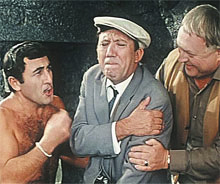 There are some people who feel a little bit of pain and stop whatever they are doing immediately. They might whine or complain frequently, and observers tend to think they are overreacting. Equally at fault, however, are the people at the other end of the spectrum: the ones who feel pain and choose to ignore it, claiming, “It’s no big deal” or “It will go away.”
There are some people who feel a little bit of pain and stop whatever they are doing immediately. They might whine or complain frequently, and observers tend to think they are overreacting. Equally at fault, however, are the people at the other end of the spectrum: the ones who feel pain and choose to ignore it, claiming, “It’s no big deal” or “It will go away.”
My sister is one of the latter. Starting a few weeks ago, she started to limp while she was running; it was painful to watch. She even developed a limp while she was walking, so finally, she went and got a bone scan. The results: a stress fracture in one her tibia and another fracture forming in her femur. Her femur. After the skull, it is is the strongest bone in the human body. She was told that a couple more weeks of running would have given her definite fractures. Now she has to take at least two months off.
You may think that my sister runs an absurd amount; she doesn’t. (She has been averaging a moderate 25 miles a week.) Perhaps she doesn’t get enough calcium? Actually, she’s been focusing on enriching her diet with healthy foods like yogurt. She was doing everything right, and she would not believe that anything was seriously wrong, yet now we know something definitely was. Hindsight tells us she should have stopped sooner, but how could she have known beforehand? There seems to be a fine line between the risk of making a petty complaint and ignoring a serious injury.
Joint pain, especially in the knees or wrist, should never be overlooked. Â Serious pain or tenderness at a specific point may indicate a significant injury. Additionally, if you feel pain somewhere, you should compare both sides of your body to see if there is swelling. You should never try to “work through” swelling. Instead use the R.I.C.E. method: rest, ice, compression, and elevation. (For more details, visit an article on our sister site Health Eagle.) If the swelling does not reduce after a couple days of treatment, you should seek a physician.
It’s better to catch a potential injury early and take time to recover, than to live with the adverse effects of a permanent problem.





